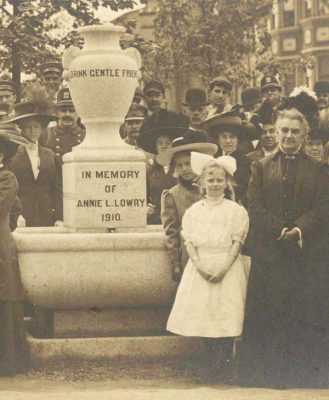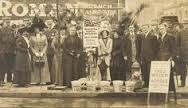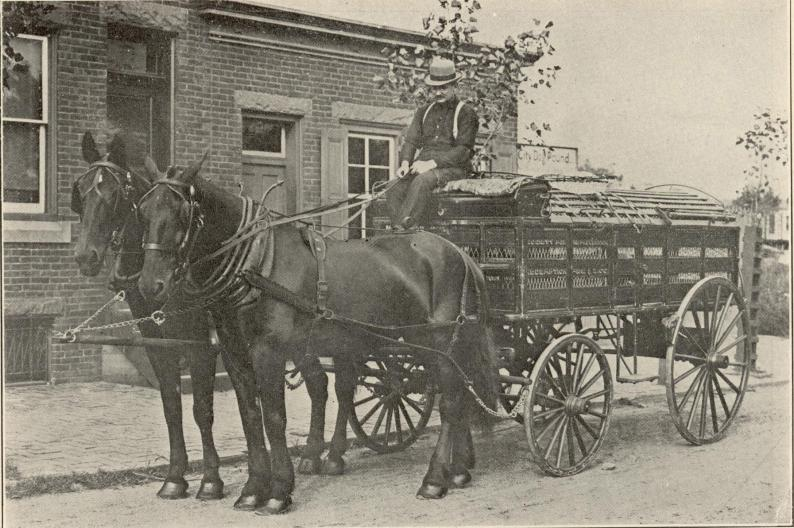April 7, 2022
Caroline Earle White: Changing the World for Animals

Caroline Earle White grew up in a little town in Pennsylvania where she would walk from her home, into town, and would constantly see horses and mules being overworked and beaten if they slowed down or tried to take breaks. Caroline had a big heart for animals and hated seeing them get abused. She started intentionally picking different walking trails so that she could avoid those streets where she would see this animal cruelty. It constantly broke Caroline’s heart, which led her to stand up for what she believed in.1

Caroline’s husband, Richard White was an attorney, and he encouraged her to have a meeting with the founder of the first American Society for the Prevention of Cruelty to Animals (ASPCA), who was Henry Bergh in 1866. Henry Bergh started this organization because his office window overlooked an area in town where he would always see animals abused. Caroline went to talk to Mr. Bergh, looking for advice on how to begin a chapter for the Society for the Prevention of Cruelty to Animals. Bergh told her that she should start by obtaining a petition and get signatures.2 White returned home with just the spark she needed. Caroline and her husband started obtaining signatures for her petition calling for the Pennsylvania Chapter for Society for the Prevention of Cruelty to Animals (SPCA). While obtaining signatures, Caroline discovered that there were others that were interested in starting a humane society. Caroline and twenty-nine other women joined together to form the PSPCA.3
Caroline’s campaigning led her to meet Colonel M. Richards Muckle, who wanted to create an organization like Bergh’s. They got together and launched the Pennsylvania Society for the Prevention of Cruelty to Animals (PSPCA) in 1869.4 Women were not viewed the same as men at the time and were looked down upon. Because of this, Caroline was not allowed to sit on the board of her own organization. In fact, Morris Waln, who provided financial support for the Pennsylvania Society for the Prevention of cruelty to Animals (PSPCA), became president of the board while Caroline was excluded from any position.5
Caroline was upset that women were not able to sit on the board of the organization started by extraordinary women, so in April of 1869, the Pennsylvania Society for the Prevention of Cruelty to Animals (PSPCA) became known as the Women’s Humane Society, formed by thirty extraordinary women. Funds were raised for the facility to be built in Bensalem, Pennsylvania. It was called the “refuge,” being the first animal shelter in the world.6 The refuge provided free veterinary care and also employed three cruelty officers. These men were authorized to prevent animal abuse and punish those involved.

The Women’s Branch was criticized for focusing on animal advocacy. Caroline White replied to these critics who thought her group should work for human causes saying,
“But are we not working for human beings? Are we not constantly striving to make men and women more humane and disposed to all kindly feelings and to teach children to become gentle and merciful? Is not everything which tends to elevate man in the mortal scale a benefit to him, and is it not rendering him incalculable service to teach him to control his passions, as we do when we prevent him from weakening his anger upon his horses?”7
In 1871, White’s organization passed the twenty-eight-hour law, requiring railroad companies to provide food, water, and rest time for animals in transport after twenty-eight hours. White’s organization had agents access railroads and punish anyone involved with the abuse of the law. Even with this law in place, people still would not listen. In 1896, the Reading Railroad was found guilty of transporting horses for fifty-two hours straight without food or water, and ended up being charged a $200 fee. White viewed the twenty-eight-hour law as the “crowning achievement” of her life.8

Animal advocacy became part of women’s social activism. This ended up leading to The Antivivisection Movement in 1883, with Caroline Earle White as the founder. This movement was formed to end experimentation on animals in research and testing. It was the first non-profit animal organization in the United States.9 Caroline’s progressive thinking were light years ahead of her time. With this being said, the Humane Society was established before child welfare existed. Children were being abandoned all over the United States. It was decided to start the Societies for the Prevention of Cruelty to Children in 1875, once it was seen that there was such a positive change that had been made in the lives of animals. Caroline Earle White had no idea that she could change the lives of everyone by standing up for animals, but she did, and it was the proudest achievement she ever had.10
- Keri Cronin, “Caroline Earle White” (Unbound Project October 13, 2016), 1. ↵
- Jane Campbell, MRS. CAROLINE EARLE WHITE, REFORMER (Records of the American Catholic Historical Society of Philadelphia 33, no. 1, 1922): 38. ↵
- Women’s Animal Center, “History of Women’s Animal Center” (Women’s Animal Center, 2018) 1. ↵
- Bernard Oreste Unti, “The Quality of Mercy: Organized Animal Protection in the United States 1866-1930,” (PH. D. United States—District of Columbia, American University, 2002), 152. ↵
- Bernard Oreste Unti, “The Quality of Mercy: Organized Animal Protection in the United States 1866-1930,” (PH. D. United States—District of Columbia, American University, 2002), 154. ↵
- Women’s Animal Center, “History of Women’s Animal Center,” (Women’s Animal Center, 2018): 1-3. ↵
- Women’s Animal Center, “History of Women’s Animal Center” (Women’s Animal Center, 2018) 1. ↵
- Jane Campbell, MRS. CAROLINE EARLE WHITE, REFORMER (Records of the American Catholic Historical Society of Philadelphia 33, no. 1, 1922): 41. ↵
- Erik Bruun, “Dictionary of American History Vol. 3: Animal Rights Movement” (New York: Charles Scribner’s Sons, 2003), 186. ↵
- Jane Campbell, MRS. CAROLINE EARLE WHITE, REFORMER (Records of the American Catholic Historical Society of Philadelphia 33, no. 1, 1922): 43. ↵
Tags from the story
animal advocacy
Caroline Earle White
Society for the Prevention of Cruelty to Animals
Recent Comments
Madeline Chandler
This was an extremely well-written article, and it was so detailed. It was so interesting because I do not have much knowledge of the story of Caroline Earle White and her fight against animal abuse. This article was so inspiring and thought-provoking that one woman stood up for his beliefs in a time when women were not allowed to be in positions of power regardless of them trying to help the world. The author truly shows that standing up for what you believe matters. It is amazing that Caroline helped created the first animal shelter.
03/05/2022
4:27 pm
Sophia Phelan
This article made me so sad because of the nature of the topic, but it also made me hopeful for future provisions to protect vulnerable populations.
03/05/2022
4:27 pm
Makayla Soto
I relate a lot to this article because I don’t support the abuse of animals either. I’m glad that she voiced her opinions as animal abuse is very common nowadays and people treat them as if the don’t feel. It’s so sad! This article is so well written into the details about how involved she got politically. Good put together article!
16/10/2022
4:27 pm
Olivia Flores
This is such great article informing us about Caroline Earl who made such a difference for the future caretaking of animals. It is nice to see how much she cared and payed attention to these horses being neglecting. If you think about it they were the only method of transportation back then and not see as anything more than an animal to take you places. It is so crucial to take care of them and not just as resources. Such a great article !
09/05/2023
4:27 pm
Juan Aguirre Ramirez
Caroline Earl, a pioneer in animal welfare, is the subject of this well-written and informative article. She showed great concern for horses that were often neglected and seen only as transportation during her time. It is crucial to care for these animals and see them as more than just resources. As someone who also opposes animal abuse, I appreciate Caroline’s efforts to raise awareness and advocate for animal welfare. This article is well-researched and detailed, with a clear focus on her political involvement. Great job on this piece Kayla!
11/05/2023
4:27 pm
Alexis Zepeda
Hello! Congratulations on publishing a great article! It is inspiring to see a movement work its way from the ground up. When hearing about stories such as Caroline’s, I always wonder if she knew the kinds of impacts she would make in getting those signatures on her initial petition. Great job!
12/05/2023
4:27 pm
Sebastian Hernandez-Soihit
informative and inspiring, this article highlights the important work she did for animal welfare of Ms.White and the impact of her efforts on society. It serves as a reminder of the power of dedicated individuals to make positive changes in the world.
12/05/2023
4:27 pm
Sudura Zakir
Animal rights concerns are usually dismissed and ignored; Caroline White is an inspiration. I don’t see how someone could be okay with hurting or overworking an animal, yet this is still a significant problem in today’s society. Knowing that others are working to stop this savagery and that change is possible is reassuring. Caroline could feel it, so why shouldn’t we be able to too? Regarding your nomination and a great read, congratulations!
12/05/2023
4:27 pm
Sallie A Williams
Caroline Earle White was a trail blazer when women were to be seen but not heard. This article shows the true, strong woman she was. Her great granddaughter was also a strong woman. Merrol White a nurse raised her four children on her own. We were allowed to have as many animals as we wanted. Caroline’s second great granddaughter had a small farm with horses, a donkey, chickens, ducks, cats and up to 15 dogs at the same time. Caroline’s 3rd great granddaughter took her horse to college to ride on the equestrian team. She owns her own 10 acre farm where she gives riding lessons. She has dogs and barn cats. Her 4th great granddaughter at the age of 10 years old has her black belt in karate and lives with three dogs. The one dog is named Caroline Earle White. So the strength, the determination and kindness towards animals continues to through the family genes.
11/12/2023
4:27 pm
Mauricio Rebaza Figueroa
Hi Kayla, this is a very good article. I really knew nothing about Caroline Earle White before reading it, but I really learned a lot from it. I think many people that read your article will relate to the feelings and situations Caroline Earle White had to go through. Also, you used really good images that helped me while reading through your work and sources that made it trustworthy. Good job.
01/05/2022
4:27 pm